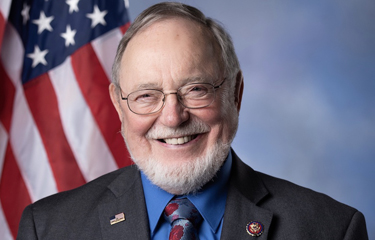US Representative Don Young, industry groups "welcome" bill to reauthorize Magnuson-Stevens Act

In the moments on Monday, 26 July, after U.S. Rep. Jared Huffman officially announced the filing of a bill to reauthorize the Magnuson-Stevens Act, statements supporting the legislation started to flow out from the press offices of seafood and fishing interest groups and environmental non-governmental organizations.
Conservation groups lauded H.R. 4690, sponsored by the California Democrat and U.S. Rep. Ed Case (D-Hawaii). In particular, those organizations appreciated the recognition of climate change as a factor in fishing.
Eric Schwaab, the senior vice president for ecosystems and oceans for the Environmental Defense Fund, said in a statement that keeping regional fishery councils intact and requiring enforceable rebuilding schedules for stressed stocks are “pillars” of the 45-year-old law that need to stay. However, he added that he was grateful to see not only that climate change-focused initiatives were included, but also that language calling for using technology to monitor stocks remained a part of the bill.
“The oceans are changing rapidly, and federal fishery management must keep pace,” Schwaab said. “Advances in our scientific understanding of the marine environment and new technological developments hold the potential to reshape fisheries management for people and nature together.”
Oceana Campaign Director Whitney Webber credited the bill’s sponsors for pushing for important updates to MSA.
“It’s time to bring our fisheries law into the 21st century and harness the power of information and technology to better manage America’s fisheries,” Webber said in a statement. “Managing our oceans in a changing climate will require modern management tools.”
The Gulf of Mexico Reef Fish Shareholders’ Alliance, an industry group, also lauded the inclusion of the climate change-focused initiatives in the legislation.
“Guidance proposed by the act would provide fishery managers a roadmap for incorporating a changing climate, dynamic oceans, and the growing importance of the intersection between land and sea into more meaningful policy,” Shareholders’ Alliance Deputy Director Eric Brazer said in a statement.
In an interview with National Fisherman, Huffman, who chairs the House Natural Resources Committee Subcommittee on Water, Oceans, and Wildlife, said updates beyond a simple reauthorization were needed for a law that hasn’t been changed in 15 years. Huffman said his changes came after more than a year of stakeholder conversations before and after his introduction of a draft bill last December.
“We’re trying to reset a really important process,” he said.
Other provisions in the bill earned the approval of industry stakeholders, including a proposal to cut red tape in regard to fisheries disaster reimbursement programs, a sore point for many fishermen who have had to wait years before getting federal relief.
“The bill’s common-sense approach to fishery resource disasters will ensure those harmed by a disaster will receive the necessary relief in a timely fashion,” Mike Conroy, executive director of the Pacific Coast Federation of Fishermen’s Associations, said in a statement.
Melania Lewis, director of communications for the National Fisheries Institute, told SeafoodSource that the organization is scoping the bill.
“NFI looks forward to reviewing Chairman Huffman's MSA reauthorization bill in great detail,” she said. “We will also be interested in monitoring the bill’s Congressional support.”
The bill’s filing was notable for its lack of a Republican co-sponsor. Democrats hold a 220-211 majority in the House, giving them the votes necessary to pass the bill even without Republican support. Even in the current hyperpartisan atmosphere in Washington, support for fisheries has tended to attract supporters from both parties in the past.
SeafoodSource reached out to several Republican lawmakers previously involved in fisheries legislation for comment, but none responded before deadline.
However, U.S. Rep. Don Young, a Republican who represents a state with a large seafood sector and who has been deeply involved in previous seafood-centered initiatives on Capitol Hill in the past, said on Twitter he is keeping an open mind toward Huffman’s legislation.
“Fisheries are central to Alaska’s culture, way of life, and economy,” he said. “To secure a sustainable future, we must reauthorize MSA. I welcome @RepHuffman's bill, and I look forward to working with him on my concerns and recommendations.”
Photo courtesy of Office of U.S. Rep. Don Young






Share